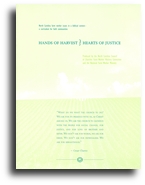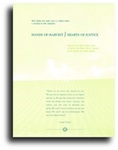
From the Introduction
“Jesus’ life and words are a challenge at the same time that they are Good News. They are a challenge to those of us who are poor and oppressed. By his life, he is calling us to give ourselves to others, to sacrifice for those who suffer, to share our lives with our brothers and sisters who are also oppressed. He is calling us to ‘hunger and thirst after justice’ in the same way that we hunger and thirst after food and water: that is, by putting our yearning into practice.”
—Cesar Chavez, Co-founder, United Farm Workers
Thank you for using the farmworker curriculum developed by the North Carolina Council of Churches Farmworker Ministry Committee and the National Farm Worker Ministry. The curriculum was written with the help of many individuals for churches to examine and reflect on farmworker issues in North Carolina in a biblical context. It is our hope that through the use of this curriculum, your congregation will lift up farmworkers and become a part of the North Carolina movement to improve the living and working conditions of those who harvest our crops.
Intended Use
The curriculum is intended for use with adult and high school worship groups, Sunday schools or Bible studies. There are seven class sessions, each approximately 45-60 minutes long, offered in the curriculum. The sessions focus on the following: Food: A Sacred Exchange; God Has No Borders; Labor in God’s Harvest; Health and Wholeness; Community and Culture; Family and Children; and Faith in Action on Behalf of Our Brothers and Sisters. We hope that your group will use all seven sessions; however the curriculum is designed so that a group can use Sessions 1 and 7 and as many in between as desired. Please note that Session 6 (Family and Children) may be appropriate for younger groups.
Curriculum Organization
Each session is organized into a Leader’s Instructions page, a Handout (to be copied and passed out to the participants) and a Learning Activity page, which can also be passed out to the participants unless otherwise instructed. All participants should also get a copy of the Farmworker Organizations page, the Resources page, and the Glossary, providing definitions of commonly used farmworker-related terms. These are found at the end of the curriculum.
Members of the Farmworker Ministry Committee may be available for leading sessions or for training groups on how to lead sessions. Contact the NC Council of Churches at (919) 828-6501 for inquiries about speakers, copies of the curriculum, or for more information. The curriculum is online at www.ncfarmworkers.org, www.nfwm.org/curriculum.shtml and www.nccouncilofchurches.org in the Resources section. At these sites, you can find additional resources and tools for use during class sessions.

